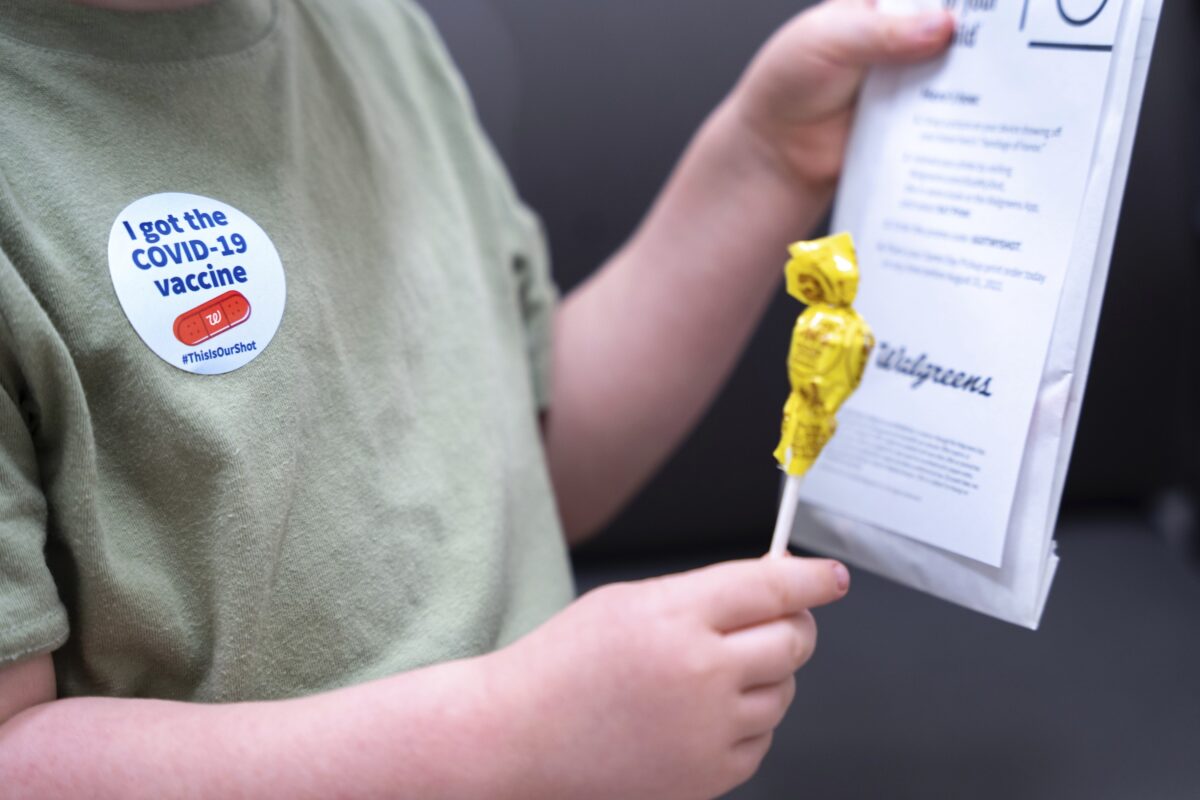5 Things to Know as American Babies, Toddlers Start Getting COVID-19 Vaccines

Some of the youngest Americans started getting COVID-19 vaccines on June 20, after U.S. authorities authorized and recommended the shots.
The under-5 population was unable to get a COVID vaccine since the beginning of the pandemic. Now, all Americans except for those younger than 6 months of age can.
Some parents had been waiting for the clearance and immediately took their children to get a shot.
“He’s never really played with another kid inside before,” McKenzie Pack of Lexington, South Carolina, told the Associated Press after her 3-year-old son got a Moderna dose. “This will be a really big change for our family.”
Others are holding off, noting that the vaccines have not proven to be as effective as originally promoted.
“It seems like everyone who’s vaccinated and boosted and fully protected has still gotten COVID,” Amy Rands of Oakland, California, told the San Francisco Chronicle.
Here are five things to know about young children and the vaccines.
Dosage Amounts
The Pfizer and Moderna vaccines are now available to young children. Pfizer’s primary series is three doses, with the second dose advised three to eight weeks after the first, and the third advised at least eight weeks after the second. Moderna’s second dose is recommended four to eight weeks after the first.
Each dose of Pfizer’s vaccine is 3 micrograms, or one-third of that given to adults and many older children. Moderna’s dosage for the youngest population is 25 micrograms, a quarter of that given to adults.
The Pfizer vaccine provides little protection until three doses are administered, the company’s trial found.
“For people who’ve gotten that vaccine, who’ve gotten say two doses of that vaccine, they have to know they’re not protected, and they’re going to have to wait a few months until they are protected. And I just wonder whether parents will understand that,” Dr. Paul Offit, who advises the Food and Drug Administration (FDA) on vaccines, said during a recent meeting.
Moderna’s vaccine, meanwhile, needs one fewer dose, but resulted in more children getting fevers.
The vaccines are being administered at pediatricians’ offices, pharmacies, and other facilities.
Like all COVID-19 vaccines, the vaccinations are being offered for free, with the government footing the bill.
Children at Little Risk From COVID-19
Approximately 2.5 million COVID-19 cases have been recorded among children aged 0 to 4 in the United States through mid-June.
About 40,000 of the infected children, or 0.1 percent, required hospital care, according to data from the Centers for Disease Control and Prevention (CDC).
About 14 percent of those were admitted for other reasons, according to the data.
Just 215 deaths of children aged 6 months to 4 have involved COVID-19, according to a preliminary count as of late.
Why the Vaccines Were Authorized
Both trials that led to the clearance relied on a technique called immunobridging instead of more traditional clinical efficacy measurements.
The technique allowed Pfizer and Moderna to compare the levels of antibodies in a selection of children to the levels in a random group of adults from trials completed in 2020.
That, the companies and some experts assert, is sufficient to show the vaccines are effective.
The view is far from universal, especially as the vaccines have performed worse against newer variants of the CCP (Chinese Communist Party) virus which causes COVID-19.
Efficacy against infection was measured as a secondary endpoint. The efficacy of Moderna’s vaccine was substandard, or under 50 percent, and the efficacy of Pfizer’s vaccine was unreliable.
Both the immunobridging analyses and the efficacy estimates were drawn from small numbers of trial volunteers.
A subgroup of 490 Moderna participants were analyzed for immunogenicity. Pfizer’s immune response measurements were based on just 220 children.
The efficacy estimates were based on about 4,100 Moderna volunteers and 992 Pfizer participants, respectively, who received the vaccines.
Neither trial returned efficacy results against severe disease or death. There were actually more cases of severe disease among vaccinated Pfizer participants than those who received a placebo.
Government scientists and their advisers say one can assume the vaccines will protect against severe illness and death based on how the vaccines have performed in older age groups. Some experts say that remains to be seen.
Division Over Need
Because of the dearth of data and the small risk COVID-19 poses to young children, along with vaccination safety concerns, experts are divided on whether children should get a vaccine.
The CDC recommends that virtually all children get vaccinated, including those down to 6 months of age. And a number of health care groups and doctors offered support for widespread vaccination.
Pediatricians should “promote vaccination and give COVID-19 vaccines,” the American Academy of Pediatrics said in a statement.
“We must not let up in our efforts to make sure all families can benefit from the protection of these vaccines,” according to Dr. Moira Szilagyi, president of the group.
But other experts argue few, if any, children need a vaccine.
The Florida Department of Health said in a statement that it does not recommend COVID-19 vaccines “for healthy children,” adding that “the currently available evidence on COVID-19 vaccines for children ages 6 months to 5 years is inadequate for assessing risks and benefits.”
Another key point: some 70 percent of small children have evidence of prior infection, which gives them a level of protection against re-infection and severe disease.
Many parents of young children are aware of the issues. Just 18 percent planned to get their child vaccinated right away, while 27 percent said they will definitely not get their children vaccinated, according to an April survey. An unpublished survey conducted by the CDC in February and presented during a recent meeting found about half of those parents would definitely or probably get their children vaccinated.
An unpublished survey of pediatricians and other child health care providers that was presented during the same meeting found that around 75 percent of the providers planned to offer COVID-19 vaccines to young children.
Safety Concerns
FDA scientists said the risk of side effects from the vaccines was outweighed by the known and potential benefits, including protecting against severe illness.
Safety data was the most robust out of the three prongs from the trials, drawing from thousands of participants in each of the studies.
A higher percentage of vaccinated participants in both studies reported adverse reactions. There was also a higher percentage of serious adverse events found in Moderna recipients compared to the placebo group, but study investigators and the FDA concluded all but two of them were unrelated to the vaccine.
Authorities said the reactions overall were similar to those seen after routine childhood vaccinations such as measles.
Some outside parties said the trial raised safety concerns, though, and encouraged parents to do research before making the decision on whether to vaccinate their child.
“I think it’s really important that they understand how many people and how many babies were actually in this in the [trials],” Kim Witczak, a drug safety advocate told The Epoch Times. “This one decision would be one that they will live the rest of their life. So they should definitely take the time and familiarize themselves with the data.”


